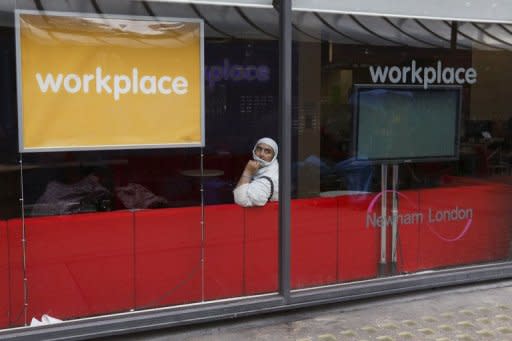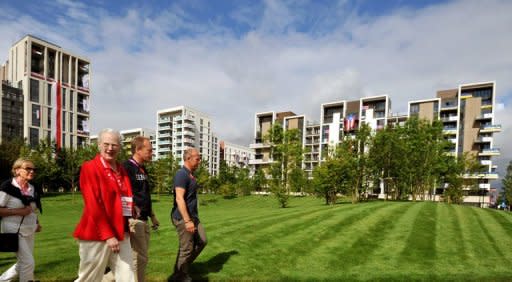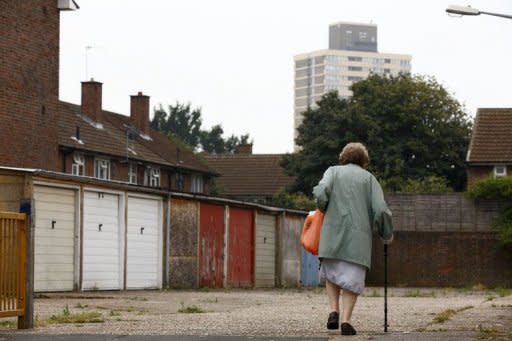Londoners still hoping for golden Olympic legacy
London may have basked in the euphoria of a successful Olympics in 2012 but now that the party is over, local people are wondering if its legacy can improve the deprived area which hosted the Games. Parts of Stratford in east London, located in one of Britain's poorest boroughs, were dramatically reshaped by an Olympics which will cost the country nearly nine billion pounds (15 billion dollars, 11 billion euros). The Olympic Park was built on partly derelict land once strewn with old tyres and disused fridges, and the huge new Westfield shopping mall has drawn brands like Prada and Hugo Boss, plus customers from across the city. But on the other side of the railway tracks which swept most of the 11 million ticket holders to the Olympics and Paralympics in the summer, the picture is different. "It's almost like they have forgotten this side of Stratford," said Abbey Collins, 22, who works in a bank in a run-down mall a stone's throw from Westfield. "I don't really see this part of Stratford changing that much. The hype, it was built up. It's not really lived up to that." Officials are confident that a 300-million-pound project currently under way to transform the Olympic Park into a community of 7,000 new homes plus schools, health centres and parkland can change that perception. It was always part of London's manifesto to regenerate Stratford and the revamped Queen Elizabeth Olympic Park is to start reopening from July 2013, with a full opening in the first half of 2014. Four Olympic venues will remain after the transformation, including the Olympic Stadium. It still has an uncertain future but West Ham United, the local Premier League football team, appear the likeliest future tenants. Some question whether many Stratford residents will be able to afford to live on the park after the redevelopment or whether it will attract more outsiders. "I think it's highly likely that the most disadvantaged communities will find it hard to access the new facilities because they won't be able to afford it, to rent or to buy," said Professor Gavin Poynter of the University of East London, who has researched urban regeneration connected to the Games extensively. Newham Council, the local government authority for about 300,000 people in the area including Stratford, said there will be 1,379 homes in the new development classed as "affordable", of which 675 will be subsidised. There are other concerns too. Newham's mayor Robin Wales told AFP that central government cuts will hit work programmes designed to get people in the high unemployment area jobs, including in the park. Wales cited data suggesting Newham, run by Britain's main opposition Labour party, will see funding cut by 244 pounds per head in 2010-11 and 2012-13 from David Cameron's coalition government as the nation emerges from recession. "The government has walked away from the legacy on jobs," he said. "It's fine to talk a legacy game, the investment in infrastructure was fantastic but just look at the money -- there have been savage cuts." Wales said the council will divert money to make sure residents do not suffer, arguing it has done "amazingly well" in getting people into work, for example at Westfield. The Department for Communities and Local Government did not respond to a request for comment, although figures prepared for the government say 5,000 Newham residents got jobs building the Olympic Park. Despite such questions, experts caution it is too early to know what the Olympic legacy will be for Stratford, given how long it will take for the effect of the regeneration to ripple out into the wider community. "I think Stratford in 50 years' time will change a lot," said John Lock, director of policy at the University of East London. "The odds are in favour of that being a good thing rather than a bad thing." And four months after a spectacular closing ceremony watched by 900 million people worldwide, some of the Olympic stardust does still linger. Alison Hills, 35, was visiting Stratford for the first time since its facelift to do some Christmas shopping at Westfield. "It does look amazing," she said. "It's quite impressive to think we have done this -- but (the question is) whether it's going to earn its money back." People walk past derelict buildings and a fenced off car park near the High Street in Stratford, east London on August 15, 2012. London may have basked in the euphoria of a successful Olympics in 2012 but now that the party is over, local people are wondering if its legacy can improve the deprived area which hosted the Games A woman sits in Workplace Newham, a council run facility to make sure local people benefit from local regeneration on the High Street in Stratford, east London on August 15, 2012. London may have basked in the euphoria of a successful Olympics in 2012 but now that the party is over, local people are wondering if its legacy can improve the deprived area which hosted the Games Queen Margrethe II of Denmark (2L) walks through the Olympic athletes village during a short tour of the site in Stratford, east London on August 8, 2012. London may have basked in the euphoria of a successful Olympics in 2012 but now that the party is over, local people are wondering if its legacy can improve the deprived area which hosted the Games. A woman walks past garages near the High Street in Stratford, east London on August 15, 2012. London may have basked in the euphoria of a successful Olympics in 2012 but now that the party is over, local people are wondering if its legacy can improve the deprived area which hosted the Games



